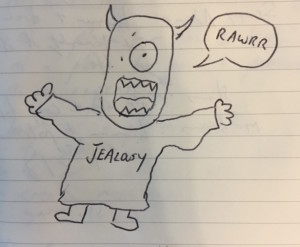Lifestyle bloggers are kind of annoying.
You know the kind I’m talking about: the people who post pictures of themselves gazing pensively out into the ocean in some exotic location, with ten billion hashtags: #summervacation #totallydeservedthis #liveyourdreams.
I’m pretty terrible at taking pictures and posting them. Here’s the only kind of lifestyle picture I’ve ever posted:

The fact that these Instagram photos still annoy the crap out of us says something about social media these days.
Social media makes it super easy for your friends to flaunt how awesome their lives are. And not just flaunt it, but stick it in your face like a big wet dirty sock in your mouth.
Oof!
The Jealous Monster Rears Its Head
 Last week, I asked you to tell me your burning pains about money, and I was blown away by all the responses I received. It’s obvious that money is pretty sensitive for many of us.
Last week, I asked you to tell me your burning pains about money, and I was blown away by all the responses I received. It’s obvious that money is pretty sensitive for many of us.
We’ll be talking more about these burning pains in the coming weeks, but today I wanted to focus on one pain point that hits us especially hard, thanks to social media:
Jealousy.
Specifically, that red hot feeling we feel inside when we see other people earning more than us.
Check out some of the email responses I received this week:
- “I feel jealous and a bit frustrated when I see my classmates going for holidays. How is it possible for their families to be rich and others are not?”
- “When I talk about money with my peers who earn more than me, I feel envious of the opportunities that are available to them because of the added cash.”
- “I have seen the rich use their money to ‘buy’ more opportunities for their children (e.g. interviews, school enrollments etc)”
I know exactly how you feel. Last week, I shared about how I used to feel jealous of my friends who were living and working in Manhattan, and likely earning many multiples of my salary.
There are plenty of reasons on why this is a dumb way of thinking, but today, I’ll focus on just one:
The Iceberg Effect
 As humans, it’s natural for us to simply take a number – a bonus, a salary, a net worth – and compare it to someone else’s. It’s natural for us to see the glossy pictures of vacations, parties, and cars on our friends’ Facebook page and feel jealous.
As humans, it’s natural for us to simply take a number – a bonus, a salary, a net worth – and compare it to someone else’s. It’s natural for us to see the glossy pictures of vacations, parties, and cars on our friends’ Facebook page and feel jealous.
However, many of us also forget that there are lots of things that we DON’T see.
I call this the Iceberg Effect, because we only observe the tip – a tiny aspect like a salary or a net worth – but we fail to see the larger issues beneath the surface.
For example, I have an investment banker friend who lives and works in New York.
One day, over a couple of beers, he lamented how close to half his salary goes towards paying taxes. Another huge chunk goes towards paying rent for a his apartment.
He shared how he spends practically all of his remaining money sustaining the lifestyle of an investment banker. It might be glamorous, but it leaves him with very little for wealth-building and retirement. Inside, he’s secretly afraid that he’ll be running on this hedonic treadmill for life.
Similarly, many homeowners may brag about their impressive condos, but they won’t publicise the true cost of owning a house, which they could be struggling with.
People Don’t Flaunt Their Problems
 There’s also more to the Iceberg Effect than just the monetary aspects.
There’s also more to the Iceberg Effect than just the monetary aspects.
Michael Ellsberg writes in The Education of Millionaires (aff link – great book!) that people are primarily concerned with three areas: Money, Relationships and Health. From his experience, very very few people – even millionaires – have all three areas tied down.
In fact, it’s often that the people who are absolutely killing’ it at “money” who neglect their relationships and health in the process. Why? Because those who climb the corporate ladder and build their empires often don’t have time to take care of the other aspects of life.
It’s pretty likely that deep down below the surface, almost everyone is struggling with something: a rocky marriage, problems with their children, strained relationships with their families, chronic diseases, etc.
There might be some things which you take for granted – like a family, your health, or being spiritually at peace – which others would be glad to give up their wealth for.
Of course, I’m not saying that every rich person has relationship and health problems. There might be some people out there who’re firing on all cylinders – but that’s probably the exception.
People don’t flaunt their problems.
How The Iceberg Effect Can Help You
So, what can you do with this?
First, when you find yourself feeling jealous of someone’s wealth, recognise that you’re only observing the tip of the iceberg.
I know this sounds a little schadenfreude-ish, but simply acknowledging that fact is enough to make you feel better and stop being irrationally jealous.
On the flip side, also recognise that just because someone appears to be down-and-out, he/she might simply be hiding some serious wealth. As a millionaire wrote in this Quora post:
One time, I went in to a Porsche dealership to buy a new car. I was wearing an old ratty t-shirt, jeans and some ancient sneakers. The GM of the dealership came up to me within 30 seconds, gave me his card and said “let me know which one you want to drive and I’ll get one of the guys to give you the keys.”
I was a bit stunned since the last time I bought a vehicle (a GMC truck) they had given me loads of crap about taking a test drive. I asked why he was so casual about letting me take any car on the lot for a spin. He said, “you look like you work in high tech. You techie guys always pay cash and usually take a top of the line model. Engineers hate dicking around with paperwork and you hate being sold to. I find the direct approach works best.”
Recognise that everyone has a lot below the surface. That’s what makes us all human.
Next week, we’ll talk about a few practical steps we can take to use the Iceberg Effect to advance our career, improve our network, and possibly make us richer.
Image credits: DailyMail, armadaproject, val.pearl

[…] By Lionel Yeo […]